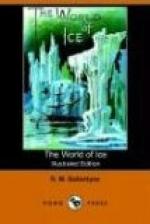Strict regulations as to cleanliness and the daily airing of the hammocks were laid down, and adhered to throughout the winter. A regular allowance of provisions was appointed to each man, so that they should not run the risk of starving before the return of the wild-fowl in spring. But those provisions were all salt, and the captain trusted much to their hunting-expeditions for a supply of fresh food, without which there would be little hope of their continuing in a condition of good health. Coffee was served out at breakfast and cocoa at supper, besides being occasionally supplied at other times to men who had been engaged in exhausting work in extremely cold weather. Afterwards, when the dark season set in, and the crew were confined by the intense cold more than formerly within the ship, various schemes were set afoot for passing the time profitably and agreeably. Among others, a school was started by the captain for instructing such of the crew as chose to attend in reading, writing, and arithmetic, and in this hyperborean academy Fred Ellice acted as the writing master, and Tom Singleton as the accountant. The men were much amused at first at the idea of “goin’ to school,” and some of them looked rather shy at it; but O’Riley, after some consideration, came boldly forward and said, “Well, boys, bad luck to me if I don’t think I’ll be a scholard afther all. My old gran’mother used to tell me, whin I refused to go to the school that was kip be an owld man as tuck his fees out in murphies and potheen,—says she, ’Ah! ye spalpeen, ye’ll niver be cliverer nor the pig, ye won’t.’ ‘Ah, then, I hope not,’ says I, ‘for sure she’s far the cliverest in the house, an’ ye wouldn’t have me to be cliverer than me own gran’mother, would ye?’ says I. So I niver wint to school, and more be token, I can’t sign me name, and if it was only to larn how to do that, I’ll go and jine; indeed I will.” So O’Riley joined, and before long every man in the ship was glad to join, in order to have something to do.
The doctor also, twice a-week, gave readings from Shakespeare, a copy of which he had fortunately brought with him. He also read extracts from the few other books they happened to have on board; and after a time, finding unexpectedly that he had a talent that way, he began to draw upon his memory and his imagination, and told long stories (which were facetiously called lectures) to the men, who listened to them with great delight. Then Fred started an illustrated newspaper once a-week, which was named the Arctic Sun, and which was in great favour during the whole course of its brief existence. It is true, only one copy was issued each morning of publication, because, besides supplying the greater proportion of the material himself, and executing the illustrations in a style that would have made Mr. Leech of the present day envious, he had to transcribe the various contributions he received from the men and others in a neat, legible hand. But this one copy was perused and re-perused, as no single copy of any paper extant—not excepting The Times or Punch—has ever yet been perused; and when it was returned to the editor, to be carefully placed in the archives of the Dolphin, it was emphatically the worse for wear. Besides all this, a theatre was set agoing, of which we shall have more to say hereafter.




